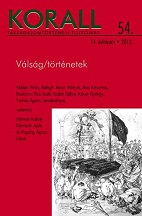Növekedés és hanyatlás az Osztrák–Magyar Monarchia történelmi emlékezetében
Economic Growth and Decline in the Historical Memory of the Austro-Hungarian Monarchy
Author(s): György KövérSubject(s): History
Published by: KORALL Társadalomtörténeti Egyesület
Summary/Abstract: While the year 1873 had been imprinted into the memory of nearly everyone recording history, another year of crisis forty years later in 1913 left barely any traces in memory. What causes this difference and how can it be interpreted? One reason is the complexity and severity of the events that took place. In addition to the financial crisis in 1873, the last great cholera epidemic also swept across the Monarchy this year. In contrast, the later crisis, triggered in the autumn of 1912 by the Balkan Wars, mainly affected financial and credit markets and industrial and commercial turnovers. It is hard to escape the impression that historical memory is shaped by the perception of crisis at least as much as ‘facts’ and ‘reality’. The study deals with the perception of crises on three levels: contemporary diaries and memoirs, the writings of contemporary economists and retrospective accounts by historians. The personal experiences of three minor characters from 1873 belong in the first category: the study examines the memoirs of Avraham Meir (1830–1907), an Orthodox Jewish merchant and District Officer Péter Krasznay (1830–1916), as well as the diary of the attorney Sámuel Szűcs (1819–1889). It is clear that the short-term crisis perceptions of contemporary witnesses depend partly on their personal disposition and partly on external factors. Sources in the second category show that contemporary academics were not entirely unaffected by this either. The study mentions pioneers of Hungarian crisis research Jakab Pólya (1844–1897), Béla Földes (1848–1945; known as Béla Weisz until 1881) and Sándor Tonelli (1882–1950). Kövér then goes on to review the terminology used by leading figures of twentieth-century Hungarian historiography: Gyula Szekfű (1883–1955) referred to the whole pre-war period as “the age of decline”, and Ferenc Eckhart (1885–1957), the author of the first comprehensive economic history of the modern era, considered the years between 1873–1889 ‘the era of crisis and stagnation’ and 1890–1914 as ‘the heyday of economic development’. In the 1960s, the concept of industrial revolution was reinterpreted. The first GDP calculations for key years (1867, 1900 and 1913) were published by Péter Hanák, Iván T. Berend, György Ránki and László Katus. Katus, using the term ‘take-off’ as a synonym for ‘industrial revolution’, divided the post-1887 period into two phases of growth: one long and ‘very fast’ period (1887–1899) followed by ‘deceleration’ (1900–1913). Kövér concludes his brief history of crisis perception with a review of recent scholarship in macro- and micro-economic history.
Journal: Korall - Társadalomtörténeti folyóirat
- Issue Year: 2013
- Issue No: 54
- Page Range: 5-27
- Page Count: 23
- Language: Hungarian

